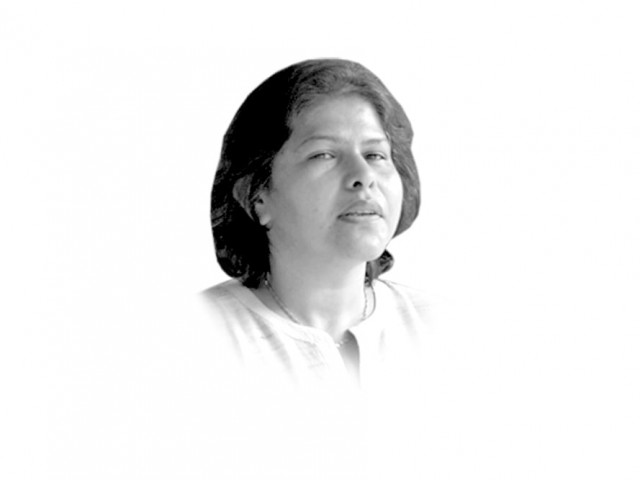Unbearable heaviness of being
Principally, nationalism anywhere can get suffocating, but more so in a country morphing into newer shapes.

I am reminded of my own childhood when national birthdays were less taxing. At least, there wasn’t that obvious pressure to celebrate and desecrate the national flag in the process. In the 1970s, it was still not fashionable to judge people because they didn’t have a big flag on top of their house or individuals didn’t wear nationalism on their sleeves. Nationalism meant largely, being who you were and then also being comfortable in that individual identity. Surely, what I didn’t realise as a child then was that things had begun to change even then. In the 1960s, a major part of the population in the then East Pakistan was punished for not following a straitjacketed formula nationalism. It became a sin and anti-nationalist to demand your rights as a citizen.
But what’s more important is that a top-down defined nationalism is here to stay. It is part of the change, which has happened at least in the last 30 years. A centralised concept of nationalism was always desired even by the founding father Muhammad Ali Jinnah, who talked about the ‘disease of provincialism’. Although Jinnah may not have wanted a theocratic state, he did desire a nation run with the engine of a central idea — united by a singular identity, language and culture. In the process, Jinnah created a new category of religious-nationalism to replace ethnicity as a defining principle of state-making. The implementation of the idea, of course, was the most difficult part, as he would find out himself, with his drive to impose a central language policy across the two wings of the country.

Taking a leaf from the original imagination of Pakistan, the state bureaucracy has struggled for long to market and impose its singular nationalism. The creation of cantonments, recruitment of people into the military or militant outfits, and the battle against ethnic nationalism are some of the measures that would fundamentally bring a new change. The process, however, involves violence, destruction and mayhem, which the state is prepared for in view of the long-term gain of minimising the strength of all ethnic nationalisms. In any case, the state bureaucracy believes that unfriendly foreign forces induce all ethnic nationalism in Pakistan. This necessitates violence and massacre.
The mayhem and resultant discomfort may appear a small price to pay if the desired result is changing the way (long term) people imagine themselves to be. So, the average Baloch, Sindhi or Seraiki may still curse the Punjabi, but would eventually adapt to the idea of the state and its religious nationalism. Furthermore, given the receding interest of foreign players in the South Asian region post-withdrawal from Afghanistan, issues like Balochistan may get relegated to the back burner. The presence of militant and religious right wing players, all of whom are partners of the state, along with use of oppression, would provide fillip to the state in terms of dominating the narrative and minimising effectiveness of ethnic nationalism. Of course, the one possible challenge remains the Pashtuns of Khyber-Pakhtunkhwa and the tribal areas, who cannot be offered religion as a mouth-watering sweetener.
The historical inability of Pakistan’s leadership to imagine the state in a manner that its diversity could be comfortably absorbed, led to the ascendancy of a formula of religious-nationalism. It’s worth wondering if Jinnah’s desire of not making Pakistan a theocratic state had any relevance, given that the founding father could not be the ultimate arbiter of religion that has shaped religious nationalism. The fact is that the Muslim Zion (what author Faisal Devji calls Pakistan) is driven by its larger identity politics to shape up in a manner, which leaves little space for religious minorities. The fate of the Ahmadis, the Shias or even the Sunnis would be determined by whoever dominates the corridors of power, but within the religious paradigm.
Sir Zafarullah Khan, the first foreign minister of Pakistan, delivered a vociferous speech in the Constituent Assembly on March 12, 1949, advocating religion as the primary principle for politics and state-making as laid down in the Objectives Resolution, 1949. However, religious politics intertwined with the principles of democracy means that it will be the narrative of the majority, which may ultimately define the religious narrative. So, it took 27 years for the state to get maneuvered into a position where the Ahmadis were declared non-Muslims. Playing on the religious wicket means you will get bowled out by those who have the ability to dominate the religious narrative and its interpretation. The problem with ideologies, especially religious ideologies, is that they are jealously guarded. Even Allama Iqbal opposed the Ahmadi interpretation of religion. The sharpening of religious nationalism has naturally resulted in greater violence. People get easily incited and kill innocent people because now their overzealousness is couched in the narrative that is the state’s lifeline.
But all of this means that Pakistan is in a flux, which puts a large number of people in an ‘unbearable heaviness of being’. Thus, you are not even sure if the flurry on August 14 and all the merrymaking is genuine or because it has become one of the few legitimate forms of fun, or that people demonstrate their affinity to the idea of a state because not doing so would mark you as an enemy. Principally, nationalism anywhere in the world can get suffocating, but more so in a country morphing into newer shapes. We still have to complete the final leg on the path of religious nationalism.
Published in The Express Tribune, August 14th, 2014.
Like Opinion & Editorial on Facebook, follow @ETOpEd on Twitter to receive all updates on all our daily pieces.













COMMENTS
Comments are moderated and generally will be posted if they are on-topic and not abusive.
For more information, please see our Comments FAQ